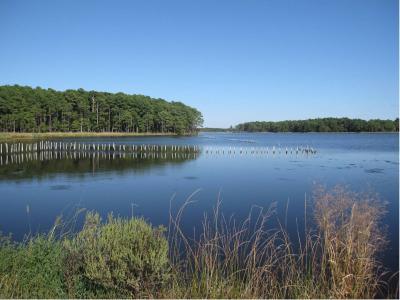Dickinson College
Troubled Waters

College awarded unique grant to study international water-management issues
by Bill Sulon
Dickinson College has been awarded an unprecedented grant from the Department of State to form an international group of professionals who will study water-management issues in the United States and Middle East.
The $500,000 grant, awarded through the Department of State’s Office of Citizen Exchanges, is testament to Dickinson’s leadership in sustainability and global education.
“This is a unique and extremely prestigious award,” said Bryan Bartosik-Velez, project manager for Dickinson’s Office of Global Education and administrative director for the grant. “This is a truly bilateral exchange.”
A Dickinson-formed commission will select 34 emerging young professionals—17 from the United States and 17 from the Middle East—who will study water-management issues in the Chesapeake Bay watershed and the Jordan River Valley.
Dickinson, which competed with 17 other colleges for the one-time grant, will collaborate with the Arava Institute for Environmental Studies, a leading Middle East environmental education and research program. Affiliated with Ben-Gurion University of the Negev in Beersheba, Israel, the institute prepares future Arab and Israeli leaders to cooperatively solve the region's environmental challenges.
The exchange program will be directed by Douglas Edlin, associate professor of political science, and Ed Webb, assistant professor of political science and international studies. Andrea Lieber, associate professor of religion, will serve as the recruitment coordinator.
“I am very excited about this opportunity to further develop our partnership with Ben-Gurion and the Arava Center,” Webb said.
Faculty will employ “a truly interdisciplinary approach in combining their expertise in policy studies, international studies, environmental studies and the sciences,” Bartosik-Velez said. “Dickinson’s commitment to liberal-arts education is perfectly suited for this endeavor.”
A State Department cable announcing the award describes Dickinson as having “one of the most internationally oriented curricula” in the United States. “Dickinson has extensive experience conducting international exchange programs—summer study institutes, academic year exchange programs and youth training programs—in partnership with diverse foreign and domestic institutions and under the auspices of the Department of State.”
Seventeen community leaders and educators from the United States will travel to the Middle East for one month next summer, and 17 community leaders from Israel, Jordan, Egypt and the Palestinian Authority will travel to Pennsylvania and the Chesapeake Bay area for one month in the summer of 2012.
Through seminars, site visits and cooperative research, the participants will focus on how environmental, economic, social and political factors converge in each region to influence policy and practice. The groups will identify strategies for evaluating and resolving conflicts among communities over limited natural resources. In the Middle East, the researchers will focus on the Negev Desert, Jordan Valley and Red Sea.
In the United Sates, researchers will study the Chesapeake Bay Commission (CBC) as an example of a flexible institutional response to challenges posed by competition for environmental resources. The CBC members are elected representatives of the Pennsylvania, Maryland and Virginia legislatures, as well as members of state administrative agencies and citizens groups.
Dickinson’s proposal is a cross-disciplinary, collaborative effort by an array of college organizations and programs, including the Office of Global Education, ALLARM (the Alliance for Aquatic Resources Monitoring), the Center for Sustainability Education (CSE), Judaic studies, policy studies, Middle East studies and environmental studies and sciences.
Published June 13, 2013